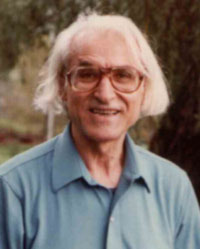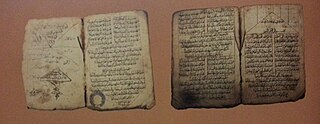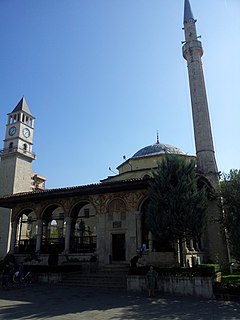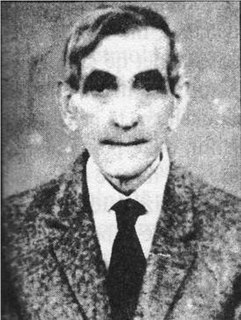
The Bektashi Order or Bektashism is an Islamic Sufi mystic movement originating in the 13th-century. It is named after the Anatolian saint Haji Bektash Wali. The community is currently led by Baba Mondi, the eighth Bektashi Dedebaba and headquartered in Tirana, Albania.

Haxhi Lleshi was an Albanian military leader and communist politician who served as the Chairman of the Presidium of the People's Assembly of the People's Socialist Republic of Albania from 1953 to 1982.

Robert Elsie was a Canadian-born German scholar who specialized in Albanian literature and folklore.

Dhimitër Pasko was a well-known Albanian writer, literary critic and translator. Along with Ernest Koliqi he is considered as the founder of modern Albanian prose; in Albanian literature his pen name for which he gained fame was Mitrush Kuteli.

Kostandin Nelko, known as Kostandin Kristoforidhi, was an Albanian translator and scholar. He is mostly known for having translated the New Testament into Albanian for the first time in the Gheg Albanian dialect in 1872. He also provided a translation in Tosk Albanian in 1879 thereby improving the 1823 tosk version of Vangjel Meksi. By providing translation in both dialects, he has the merit of founding the basis of the unification of both dialects into a national language.

The Peasant Revolt in Albania, also known as the Islamic Revolt or Muslim Uprising in Albania, was the uprising of peasants from central Albania, by mostly Muslims, against the regime of Prince Wilhelm of Wied during 1914. It was one of the reasons for the prince's withdrawal from the country, marking the fall of the Principality of Albania. It was led by Muslim leaders Haxhi Qamili, Arif Hiqmeti, Musa Qazimi and Mustafa Ndroqi. As well as total amnesty, the rebels demanded the return of Albania to the suzerainty of the Sultan of the Ottoman Empire.

Arshi Pipa was an Albanian-American philosopher, writer, poet and literary critic.
The literature of Kosovo is composed of literary texts written in Albanian, Serbian, Bosnian, and Turkish, specifically by authors of Kosovo. Kosovo produced several prominent writers in the Ottoman era. However, Ottoman authorities banned the written use of the Albanian language until 1912. This policy continued during Serb rule until the outbreak of World War II.
Constantine of Berat, known among Albanians as Kostandin Jermonak Berati or shortly Kostë Berati, was an Albanian writer and translator of the 18th century.

Tahir Efendi Jakova, also known as Tahir Efendi Boshnjaku or The Great Efendi, was an Albanian religious leader of the Yakova region in Kosovo, as well one of the most known Albanian bejtexhi. He lived and served as a clergyman in Yakova. The best known work from him, Emni Vehbije was published with Arabic alphabet in Istanbul in 1835. A reprint of it with Latin alphabet was done in 1907 in Sofia, Bulgaria.

Haxhi Et'hem Bey also known as Haxhi Et'hem bey Mollaj (1783–1846) was an Ottoman Albanian administrator, nobleman and bejtexhi.
Zenel Bastari or Zenel Hyka was an Albanian poet of the Bejtexhinj literary movement. A native of Tirana, he lived and worked from the end of 18th century until mid 19th century. Together with Hasan Zyko Kamberi and Nezim Frakulla he was part of the Bejtexhinj who focused on social and political criticism rather than Islamic moral and life. A precursor of the bourgeois critical-realism, he is also considered one of the first anti-feudal writers in Albania.

Risto Siliqi was an Albanian poet, publicist, lawyer, and militant of the Albanian national cause. His work was influenced by ideas and sentiments of the Romantic-Nationalism like other poets of the national Awakening before him.

The Albanian Orthography Congress was a linguistics event held in Tirana, People's Republic of Albania in 1972. It established for the first time the unified orthographic rules of the Albanian language which are still in use today.

Idriz Ajeti was an Albanologist from Kosovo and one of the main researchers and authorities on the Albanian language studies of post World War II. He was involved for a long period in the academic life of the University of Pristina, and was a member of the Academy of Sciences and Arts of Kosovo, being its chairman for seven years.
Dalip bey Frashëri, also known with the pen-name Hyxhretiu, was an Albanian Bektashi sheikh and bejtexhi of the 19th century. His poem Kopshti i te mirevet is the first and the longest epic known in the Albanian literature.
Shahin Frashëri was an Albanian bejtexhi of the 19th century. His Mukhtarnameh poem is one of the longest and earliest epics in Albanian literature.

Hafiz Ibrahim Dalliu was an Albanian alim, writer, publisher, educator, and activist of the Albanian national cause. He is remembered as one of the best mufassirs in Albania.

Tahir Nasuf Dizdari was an Albanian orientalist, folklorist, and scholar. He was the main orientalist in Albania, and contributed in identifying and studying oriental words borrowed from Albanian.
The Peza Conference was held in Pezë, a village near Tirana in Albania, on September 16, 1942. The conference's goal and objective was to organize different political forces in the resistance against Italian rule. Later, this organization was named the National Liberation Movement.














